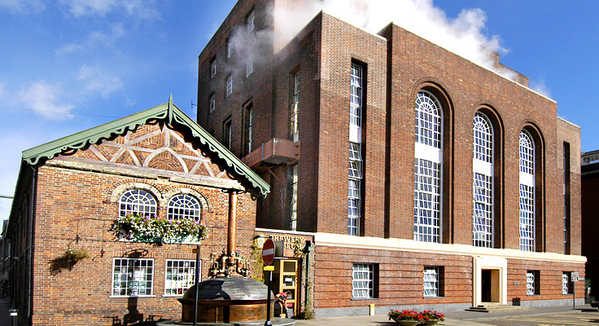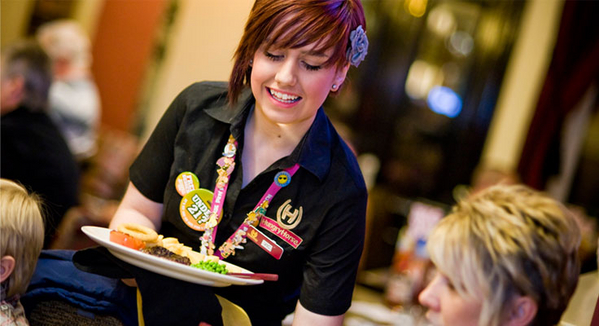New brewery, new beers as Greene King looks to the future with big choice of pubs
Added: Monday, September 23rd 2013

Greene King’s striking Art Deco brewhouse in Bury St Edmunds is covered in scaffolding, with the street alongside cordoned off from pedestrians. “You’re not pulling it down?” I ask chief executive Rooney Anand.
He visibly winces. “Brewing is our roots, our history,” he says. The current site was built in1938 but the company dates from 1799, when Benjamin Greene set up in business in the Suffolk market town and later merged with another local brewery run by the King family.
“And brewing was going on here for centuries before that, when monks from the abbey were in charge,” Anand adds.
To stress the key role of making beer to the company, I’m given a glimpse of what’s going on behind the facade and the scaffolding. Stainless steel mashing, boiling and fermenting vessels, built in the great brewing town of Burton-on-Trent, are being gingerly lowered into place by a bevy of men in fluorescent jackets and hard hats.
It’s a new “innovation brewhouse” that will run alongside the main giant vessels that produce such core brands as IPA, Abbot Ale and Old Speckled Hen. The new micro-plant, masterminded by head brewer John Bexon, will come on stream in November and will produce short-run beers with a maximum of 30 barrels per brew.
Greene King is responding to consumer demand for different beer and different styles. Bexon hasn’t fully worked out his plans yet, but the new plant will be flexible enough to make Belgian and German wheat beers along with porters, stouts and strong interpretations of India Pale Ale.
The new micro brewery shows that Greene King may be proud of its past but it’s looking firmly to the future. There’s been massive change in the business since Rooney Anand has been at the helm. He was appointed managing director of the brewing division in 2001 and became chief executive of the entire company in 2005.
At the turn of the century, Greene King had pubs. Today it has brands.
“We were late getting into branded pubs,” Anand admits. “Bass and Whitbread showed us the way. But we did see the credit crunch coming early. I remember 2007 and watching the collapse of Northern Rock on TV, with people queuing to get their money out of the bank. It rocked the confidence of the nation and meant more and more people would stay at home – and that would have a big impact on our sales.”
But he didn’t withdraw from the High Street. In 2004 Greene King had boosted its tied estate by buying 432 Laurel Inns, former Whitbread managed pubs. The company grew its pub estate from 700 to 1,000 during the credit crunch and it’s was done by offering people good value, affordable outlets.
The driving force has been the Hungry Horse chain. The 200th outlet has just opened in Wallsend on Tyneside, which emphasises the national reach of Greene King today, which also owns the Belhaven brewery over the border in Dunbar.
Hungry Horse was bought in 1996 from Michael Cannon’s Magic Pub Company. “They’re community eateries and they were our vehicle for coping with the recession,” Anand says. “Times are tough and people are careful with their money. In a Horse they can get a meal for £7 but they may come back with their family and spend £150 for four. But you can just have a beer at the bar if you don’t want to eat.”
He says he has no target figure but Hungry Horse could grow to as many as 300 outlets. “It’s our Ronseal brand – it does what it says on the tin. Some are community outlets with a 50-50 wet/dry split, others are destination venues where we sell more food.”
Like Topsy, Greene King has just kept on growing. It seems to be recession proof. The pub estate now stands at 2,300 and total staff employed in brewing and retailing is 22,000.
“And nobody will be on zero contracts,” Anand says firmly, responding to recent criticism. “We’re removing them. They were mainly part-time jobs, anyway. The success of Greene King is measured by staff happiness and we’re recruiting more people.”
Clover Leaf, rebranded Farmhouse Inns, was bought in 2011. It’s a small, food-driven chain of family-friendly pubs, based mainly in the north but it will be rolled out nationally. One is opening shortly in Scotland and “they’re all new builds,” Anand stresses.
Real Pubs and Capital Pubs were also acquired in 2011 and are “essentially gastro pubs,” he says. They have been rebranded as Metropolitan Pubs and offer, he says, good beer and food in a relaxed atmosphere. “They’re earthy, with second-hand furniture, open-plan kitchens and high quality food.”

Nick Pring, the founder of Real Pubs, has been retained as an advisor. “We need to use ‘smart cookies’,” Anand says. “We don’t buy companies and kick the good guys out but keep them on to use their skills.” The chain is London-based but Greene King is looking at the possibility of opening a branch in Cambridge.
Anand describes Old English Inns, which offer accommodation, as “ticking along nicely. We’re in investing in the food side.”
He denies that the fish and oyster restaurant chain Loch Fyne, bought in 2007 for £68m, is struggling. “They had a strong start under us, but recession hit branded restaurants and the group was a challenge for a while, but it’s trading well now. We’re keeping to the pattern but we’re making menus more affordable. There’s a ‘fish your way’ scheme where customers can choose to have their dish pan-fried, grilled or poached, with a choice of sides and sauces. They can customise their meals and can do it using the Internet.”
With 1,000 managed pubs contributing two-thirds of the group’s profits, was the tenanted side of the business under strain? Anand admits tenancies are more challenged than managed houses.
“We’ve sold a number of tenancies but we’ve re-invested the revenue. It’s harder for tenants to choose brands and control quality and service. But there will always be a role for them.”
And he will do his best, he says, to maintain rural pubs. “We want village pubs to thrive. But some areas have been over-stocked with pubs and sometimes the people who complain about closures are the people who don’t use them. We won’t sell a pub if it’s viable and we won’t place restricted covenants on those we do close.”
Tenants are allowed to buy beer outside the tie and the brewery has brought in a Local Heroes scheme that encourages publican to have half Greene King beers and half from other local breweries within a 30 or 40 miles radius of each pub.
Far from diminishing the sale of Greene King beers, Rooney Anand smiles wolfishly and says: “We’re selling more of our beer as a result. There’s great interest in craft beer but we find that our customers gravitate back to IPA and Old Speckled Hen.”
He is unfazed by the news that Sharp’s Doom Bar has overtaken IPA as the biggest selling standard bitter in the country. “Good luck to them, -- they’ve run an aggressive campaign but IPA is the best if not the biggest.”
He points out that spin-offs from Old Speckled Hen, such as Golden Hen, have proved enormously popular, while the original OSH, bought from Morland’s in Abingdon, is the UK’s best-selling bottled beer and has overtaken Newcastle Brown.
He vigorously defends his policy of buying and closing breweries, including Morland, Hardys & Hansons and Ridleys. He openly admits he bought them to acquire their pubs.
“We have to balance the economics of making beer and running pubs. Brewing is the biggest cost and plant has to be well utilised. If it’s not fully utilised it can be a drain on resources and stop us investing in pubs, campaigns and TV commercials.”
Rooney Anand was a vocal supporter of minimum pricing for alcohol and he says it’s a not a dead issue.
“It may not be the only answer but the industry makes a lot of money from alcohol and we need an intelligent attitude to drinking in this country. The industry needs to grab the agenda or after the smoking ban the direction of travel will be towards alcohol.
“The price of alcohol came down in supermarkets and it’s had an irreversible impact on drinking. When most alcohol was consumed in pubs, landlords could tell people how to handle it. Customers could be merry but not drunk.
“That’s all changed over the past 10 to 15 years. Now hospital A&E departments need security guards at weekends. Is this a civilised society?”
He will continue to campaign on the subject and will also lobby parliament and make his voice heard on such issues as the current government consultation over the role of pub companies. He says Greene King resigned from the British Beer & Pub Association because he felt that producers and retailers didn’t usually sit down at the same table.
“It’s supposed to a beer and pub association and an international spirits group sitting alongside family and regional brewers didn’t seem to fit,” he says. “Not being a member has freed up time and money. And we still meet other partners in the industry.”
Greene King may not working in splendid isolation but it has carved out a remarkable route to success by dramatically changing its strategy for brewing and retailing beer during Rooney Anand’s term in office.
And if you’re as ravenous as the proverbial gee-gee, he has just the place for you to go.
The man
Rooney Anand is 49, married to a French wife from Dijon. They have three sons and a daughter. He was born in Walsall and studied at Bristol Polytechnic and Aston Business School. Before joining Greene King he worked for United Biscuits and Sara Lee Bakery. His annual income as CEO of Greene King, made up of salary, bonus and non-cash benefits, is £984,000.
The company
Latest operating profit: £248 million, an increase of 5.1% over previous year.
2,300 pubs, of which 1,000 are managed.
Branded pubs and restaurants:
Hungry Horse
Old English Inns
Loch Fyne
Eating Inn
Farmhouse Inns
Metropolitan Pubs
Flame Grill
Meet & Eat
Value Sport




